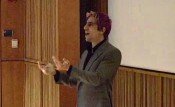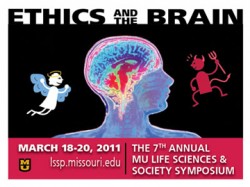For several decades now, neuroscientists have used technology to produce images of the brain in action. But what do such pictures tell us? Should they change the way we think about personal identity and free will? Can they reveal whether a person is capable of making moral decisions, or whether a person is telling the truth? If so, brain imaging technology seems to hold great promise for the criminal justice system. However, allowing brain scans to be used as evidence in trials for conviction or sentencing raises many questions about the nature of responsibility, the nature of fairness, and the public perception of science and technology.
The 2011 LSSP symposium, Ethics & the Brain, will bring to campus seven leading researchers from the fields of neuroscience, law, psychology, philosophy, anthropology, and theology to discuss these issues.
The symposium will take place on the flagship campus of the University of Missouri in Columbia, Missouri. It is free and open to the university community and the public and is designed to encourage dialogue across methodologies and backgrounds.
Videos provided to The Science Network by the University of Missouri.
Note: The audio on videos four through eight is not up to the technical standards preferred by The Science Network. We have included the videos anyway as the content is important.
-
 |
Neurocriminology: Neuroethical and Neurolegal Implications
Adrian Raine, Richard Perry University Professor in the Departments of Criminology, Psychiatry, and Psychology, University of Pennsylvania
March 19, 2011
Speakers: Adrian Raine
Run Time: 59 minutes
The very rapid developments taking place in brain imaging science are creating an uncomfortable tension between our concepts of responsibility and...
|
-
 |
The Experiential Future of the Law
Adam Kolber, Professor of Law, Brooklyn Law School
March 19, 2011
Speakers: Adam Kolber
Run Time: 50 minutes
Pain, suffering, anxiety, and other experiences are fundamentally important to the law. Despite their importance, we have limited ability to measure...
|
-
 |
Why We Can’t Blame Our Neurons
Nancey Murphy, Professor of Christian Philosophy, Fuller Theological Seminary
March 19, 2011
Speakers: Nancey Murphy
Run Time: 53 minutes
The increasing ability of neuroscientists to describe brain processes associated with human decision-making and action rightly raises the worry about...
|
-
 |
Panel Discussion
with Adrian Raine, Adam Kolber, and Nancey Murphy
March 19, 2011
Speakers: Adrian Raine, Adam Kolber, Nancey Murphy
Run Time: 50 minutes
Adrian Raine, an internationally renowned expert in the emerging field of neurocriminology, integrates neuroscientific and social perspectives in...
|
-
 |
How the Mind Makes Morals
Patricia Churchland, Professor of Philosophy, University of California, San Diego; Adjunct Professor, Salk Institute
March 20, 2011
Speakers: Patricia Churchland
Run Time: 53 minutes
Self-preservation is embodied in our brain’s circuitry: we seek food when hungry, warmth when cold, and sex when lusty. In the evolution of the...
|
-
 |
How to Do Things with Brain Images
Joseph Dumit, Director of Science and Technology Studies, Professor of Anthropology, University of California, Davis
March 20, 2011
Speakers: Joseph Dumit
Run Time: 57 minutes
Brain images in popular culture do and say a lot more than they were designed to do. In colorful and starkly different shapes, they often speak...
|
-
 |
Getting Mad About the Bad: Emotion and the Moral Brain
Jesse Prinz, Distinguished Professor of Philosophy, City University of New York, Graduate Center
March 20, 2011
Speakers: Jesse Prinz
Run Time: 58 minutes
According to a long-standing tradition in philosophy, moral judgments are based on emotions; we decide whether something is wrong by seeing how it...
|











